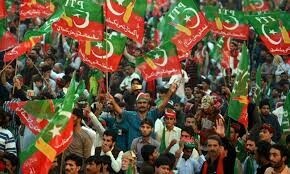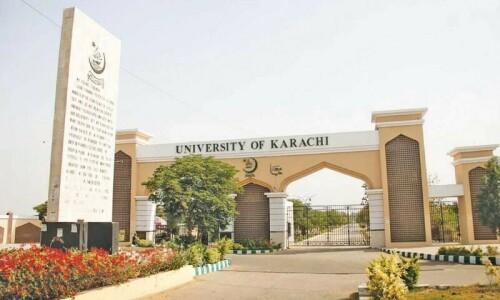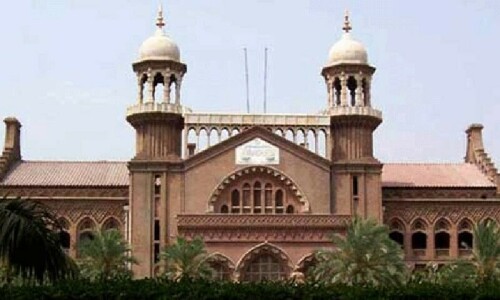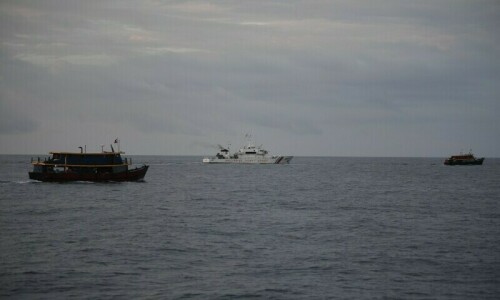ISLAMABAD: PTI chairman Imran Khan has become the fourth mainstream political leader to have faced restricted media coverage, with MQM founder Altaf Hussain, PML-N supremo Nawaz Sharif and his daughter Maryam Nawaz already gone through or suffering a similar fate.
However, in banning Mr Khan’s live speeches on electronic media, the Pakistan Electronic Media Regulatory Authority (Pemra) took a leaf out of its old playbook that it had used previously against the other three leaders, applying the same court orders and the section of the Pemra Ordinance, 2002.
Section 20 of the Pemra Ordinance, 2002, used to ban Mr Khan’s speeches on electronic media, was previously used by the regulator against Ms Maryam in 2019, when the PTI was in power.
The Pemra’s order against the former premier has reproduced the transcript of his speech made at Islamabad’s F-9 Park on Friday evening.
After Altaf, Nawaz and Maryam, PTI chief becomes fourth major leader to face restricted media coverage
It had been observed that Mr Khan was continuously levelling “baseless allegations” and “spreading hate speech” through his “provocative statements” against state institutions and officers in his speeches, the order stated.
The regulator highlighted that the PTI chief’s speech contained “hateful, slanderous and unwarranted” statements against state institutions and officers, violating Article 19 of the Constitution, titled “Freedom of Speech, etc”.
The regulator also referred to past court orders used to ban speeches of the three leaders.
On July 6, 2019, Pemra had barred the TV channels from airing “unedited live telecast” of Ms Maryam’s press conference in Lahore, alleging that she was maligning the judiciary.
The regulator said the speech violated its ordinance’s Section 20, which stipulated the terms and conditions for licenced TV channels, including ensuring “preservation of the sovereignty, security and integrity of the Islamic Republic of Pakistan”, of “national, cultural, social and religious values and principles of public policy as enshrined in the Constitution”, etc.
Pemra said at the time that Ms Maryam in her press conference expressed contempt for Supreme Court orders passed on Sept 12, 2018 in a suo motu case.
Now, the regulator has used the same order as a pretext to ban Mr Khan’s live speeches.
In October 2020, Pemra had barred channels from airing speeches, interviews and public addresses by absconders and proclaimed offenders — a directive aimed at PML-N supremo Nawaz Sharif, who had left for London a year ago.
The order came after the three-time former premier slammed the government in a party meeting, which was aired on numerous news channels. Mr Sharif was also accused of instigating the public against state institutions and maligning the judiciary.
The then information minister, Shibli Faraz, at the time said that Mr Sharif had become “another Altaf Hussain”.
Mr Faraz alleged that Mr Sharif’s speeches were provocative and said the law could not be applied differently for Mr Sharif when Altaf Hussain’s speeches were not allowed to be aired.
Mr Hussain was the first among the four political leaders to be banned or restricted from electronic media.
In Sept 2015, the Lahore High Court not only banned the broadcast of Mr Hussai’s speeches but also restricted electronic and print media from running his images.
‘Capping thought process’
The Pemra’s action to bar channels from airing the PTI chief’s live speeches has been criticised even by political opponents.
“Banishing completely a political leader from the media is not the best policy even if laws can be stretched to do so and even if it was done in the past. It didn’t work in the past, is unlikely to work now. It risks making someone bigger than life unwittingly and undeservingly,” PPP leader Farhatullah Babar tweeted on Sunday.
Civil rights activist and advocate Imaan Zainab Mazari-Hazir said that these moves against political leaders were unfair. “From Altaf Hussain, Nawaz or Maryam to Imran Khan, any political reaction should not be banned,” she told Dawn.
Such restrictions were equal to capping the thought process, she said, adding that there had to be an appropriate reply and counternarrative to counter the rhetoric of political leaders [instead of banning their speeches].
Published in Dawn, August 22nd, 2022















































Dear visitor, the comments section is undergoing an overhaul and will return soon.